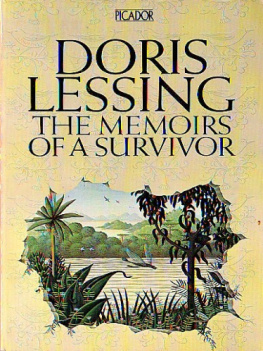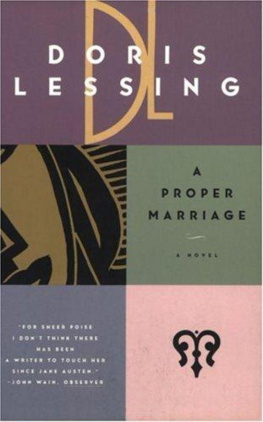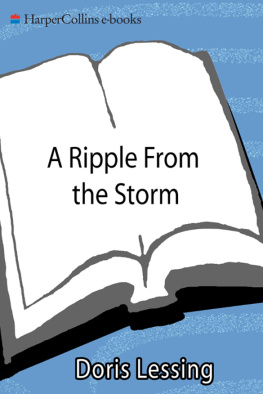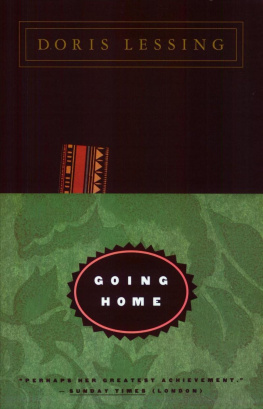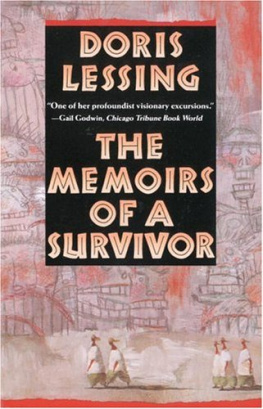Doris Lessing was born in Persia in 1919, and spent her childhood on a farm in Rhodesia. In 1949 she arrived in England with the manuscript of her first novel, The Grass is Singing . Other novels by Doris Lessing are The Golden Notebook , the Children of Violence sequence ( Martha Quest, A Proper Marriage, A Ripple from the Storm, Landlocked and The Four-Gated City ), Briefing for a Descent into Hell and The Summer Before the Dark . Her collections of short stories include This Was the Old Chiefs Country , The Sun Between Their Feet , Five , The Habit of Loving , A Man and Two Women and The Story of a Non-Marrying Man .
An attempt at autobiography, says Doris Lessing, describing The Memoirs of a Survivor , which has qualities that make it seem like a fable or a magical tale, but is square in that ancient tradition where the storytellers leap into the fantastic has, by the rules, to be made from a ground of the most solid reality. Here, though, reality is the everyday of a few years hence, when barbarism is what is normal, and each of us has to fight for survival - men, women, and even little children who are so brutalized by necessity they are more frightening than the ferocious adults. From her windows the narrator watches things fall apart, sees the migrating hordes seethe past in search of the safety, the shelter, the good life that is always somewhere else - far from the anarchy of this emptying city where people huddle together in tribes for self-defense, where plants and animals are taking over deserted streets and houses. She also watches over the child Emily, brought into her care by a stranger who instructs: Look after her, she is your responsibility, before vanishing. Emily - who, by the time the story is told, has become a beautiful world-worn young woman not yet sixteen - is also guarded by Hugo, half cat and half dog, Emilys animal, the bizarre and lovable beast whose presence dominates this tale.
Inside the room whose windows look out on savagery is the entrance to the place behind the wall where ordinary time can unexpectedly dissolve in the phantasmagoric scenes which may be painful evocations of the helplessness of a very small child, or imaginative reshapings of autobiographical experience, or the strong, sweet, powerful intimations of presences and beings not human who watch over us. This is a world that changes and dissolves as you watch, like clouds or like dreams but what is it? Where? The author does not say, but while civilization crumbles to its end in the visible world, something very different is being made, being brought to a conclusion there, in that hidden place, the hinterland to our daylight lives where, some people believe, our other selves also live, breathe, grow
This darkly visionary metaphor of a book seems at first not what we might have expected from an author whose strength is her painstaking grasp of the commonplace, the acknowledgement of the lessons of the ordinary, but as we read on and recognize the Leasing landscape that lies so solidly under these spinning soap-bubbles reflecting the fragments of a collapsing world we have to say: Yes! Of course! - for The Memoirs of a Survivor develops themes already familiar from The Four-Gated City , Briefing for a Descent into Hell , The Summer Before the Dark , and parts of The Golden Notebook , This book is being described as the quintessence of Doris Lessing.

First published 1974 by the Octagon Press Ltd
This Picador edition published 1976 by Pan Books Lid,
Cavaye Place, London SW10 9PG
6th printing 1981
The Octagon Press 1974
ISBN 0-330 24623 2
Set, printed and bound in Great Britain by
Cox & Wyman Ltd, Reading
This book is sold subject to the condition that it shall not, by way of trade or otherwise, be lent, re-sold, hired out or otherwise circulated without the publishers prior consent in any form of binding or cover other than that in which it is published and without a similar condition including this condition being imposed on the subsequent purchaser
This book is for my son Peter
1
We all remember that time. It was no different for me than for others. Yet we do tell each other over and over again the particularities of the events we shared, and the repetition, the listening, is as if we are saying: It was like that for you, too? Then that confirms it, yes, it was so, it must have been, I wasnt imagining things. We match or dispute like people who have seen remarkable creatures on a journey: Did you see that big blue fish? Oh, the one you saw was yellow! But the sea we travelled over was the same, the protracted period of unease and tension before the end was the same for everybody, everywhere; in the smaller units of our cities - streets, a cluster of tall blocks of flats, a hotel, as in cities, nations, a continent yes, I agree that this is pretty highflown imagery considering the nature of events in question: bizarre fish, oceans, and so forth. But perhaps it wouldnt be out of place here to comment on the way we -everyone - will look back over a period in life, over a sequence of events, and find much more there than they did at the time. This is true even of events as dispiriting as the litter left on a common after a public holiday. People will compare notes, as if wishing or hoping for confirmation of something the events themselves had not licensed - far from it, something they had seemed to exclude altogether. Happiness? Thats a word I have taken up from time to time in my life, looked at - but I never did find that it held its shape. A meaning, then; a purpose? At any rate, the past, looked back on in this frame of mind, seems steeped in a substance that had seemed foreign to it, was extraneous to the experiencing of it. Is it possible that this is the stuff of real memory? Nostalgia, no; Im not talking of that, the craving, the regret - not that poisoned itch. Nor is it a question of the importance each one of us tries to add to our not very significant pasts: I was there, you know. I saw that.
But it is because of this propensity of ours that perhaps I may be permitted the fancy metaphors. I did see fish in that sea, as if whales and dolphins had chosen to show themselves coloured scarlet and green, but did not understand at the time what it was I was seeing, and certainly did not know how much my own personal experience was common, was shared: this is what, looking back, we acknowledge first - our similarities, not our differences.
One of the things we now know was true for everybody, but which each of us privately thought was evidence of a stubbornly preserved originality of mind, was that we apprehended what was going on in ways that were not official. Not respectable. Newscasts and newspapers and pronouncements were what we were used to, what we by no means despised: without them we would have become despondent, anxious, for of course one must have the stamp of the official, particularly in a time when nothing is going according to expectation. But the truth was that every one of us became aware at some point that it was not from official sources we were getting the facts which were building up into a very different picture from the publicized one. Sequences of words were crystallizing events into a picture, almost a story: And then this happened, and so-and-so said ... but more and more often these were words dropped during a casual conversation, and perhaps even by oneself. Yes, of course! one would think. Thats it. Ive known that for some time. Its just that I havent actually heard it put like that, I hadnt grasped it
Attitudes towards authority, towards Them and They, were increasingly contradictory, and we all believed that we were living in a peculiarly anarchistic community. Of course not. Everywhere was the same. But perhaps it would be better to develop this later, stopping only to remark that the use of the word it is always a sign of crisis, of public anxiety. There is a gulf between: Why the hell do they have to be so incompetent! and God, things are awful! just as Things are awful is a different matter again from It is starting here too, or Have you heard any more about it?
Next page
